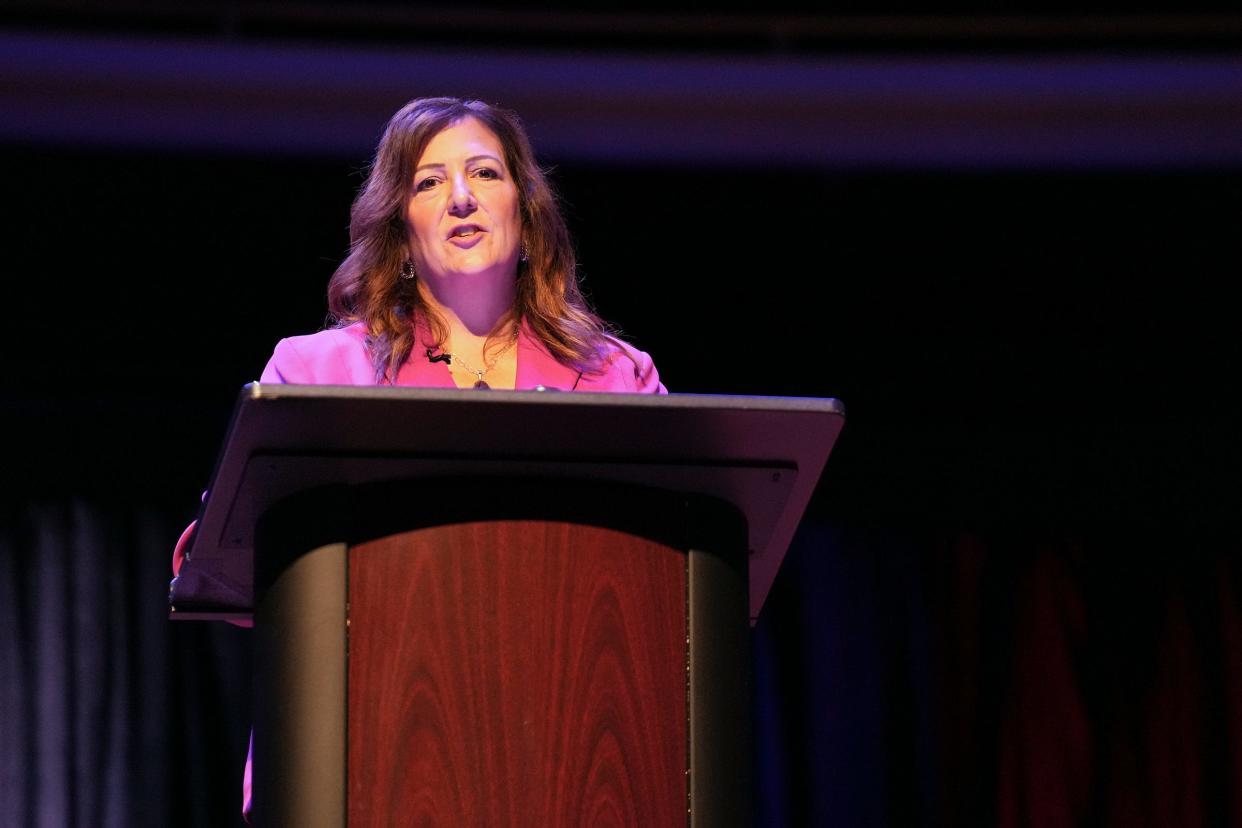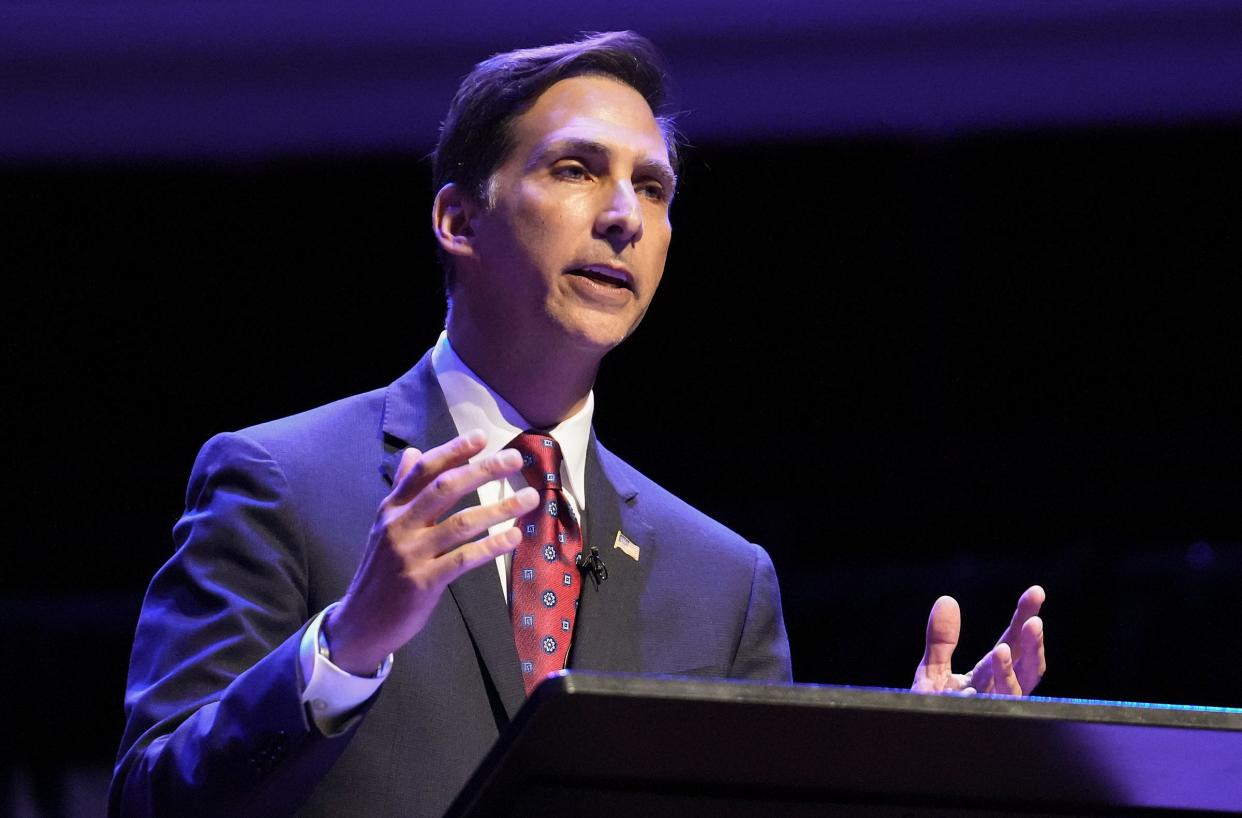Carmel mayor race: Sue Finkam and Miles Nelson on housing, roads and sculptures
Colleagues on the Carmel City Council are battling in the race for the suburb’s first new mayor in 28 years.
Republican Sue Finkam and Democrat Miles Nelson both said they like where long-serving Mayor Jim Brainard has led the city and would consider the same general flight path if they were victorious.
With perhaps one, highly visible, exception.
“I think we’ve hit the saturation point with statues downtown,” Finkam said of the 16 life-size sculptures of people in the Arts and Design District, a hallmark of Brainard’s pursuit of public art. “I don’t look to be buying any more in my administration.”
Heresy, said Nelson. “These statues create discussion,” he said. “Like them or hate them, they build community.”
Otherwise, the candidate share similar visions — with some wrinkles — on economic development, affordable housing, transportation and the arts.
Moms for Liberty: Conservative group becomes focus of Carmel's race for mayor
In addition to the two candidates whose names will appear on the ballot, Darin Johnson is running as a write-in candidate.
The general election is Nov. 7. Early voting in Hamilton County is under way.
Sue Finkam
Finkam is serving her third term on the Carmel City Council, representing the Northeast District. She is founder and CEO of Fire Starter LLC, a woman-owned marketing agency.
She moved to Carmel in 2007 so her son could enter Carmel schools as a kindergarten student and she got involved in civic groups before running for council in 2012. Finkam is married to Joe, owner of an HVAC and energy solutions manufacturing facility, and their son, Drew, is now in college.
Economic development: Finkam said she would establish a separate city department for economic development with an industry professional to act as a liaison to help with recruitment of companies, locations and employee retention.
The department would be separate from the city’s Economic Development and the Redevelopment commissions and would focus on helping to build up the tech industry presence and making sure small businesses can thrive.
“There is always an opportunity for the tech sector and those skilled workers and no reason we can’t chase those jobs,” she said.

Housing: Finkam said the boom in apartment construction in downtown and Midtown has been good for the city but it may be reaching the point of saturation.
“The issue of density comes up a lot with voters who think we have too many for-rent homes,” she said. “We have to be careful, or we run the risk of too many apartments.”
She said she often hears from retired homeowners who want to move out of their large single-family places but not into small rentals. Some sell and leave the city for lower-priced homes elsewhere.
The solution is to increase the number of condominiums and other alternative housing styles that are smaller and cheaper to own, she said.
Affordable housing: Finkam said people who work in the service industry and other middle-class residents, such as teachers, face a shortage of places they can afford to live. She will continue working with Councilman Tony Green to pass an ordinance that would keep parts of Home Place along College Avenue affordable. The city annexed the neighborhood in 2018, and it has the city’s most affordable housing. A new zoning designation would prohibit extensive gentrification there.
Early voting: Here's where you can cast a ballot in Central Indiana right now
Finkam also supports apartment developers providing some units that rent below market value so workers and seniors can afford them.
Transportation: Finkam said she doesn’t see a need for an expansive public transportation system but favors a shuttle system.
“I don’t want to see any major investment like a train,” she said. “But some type of transportation like a county-wide circulator could work.”
Finkam also opposes an extension of the IndyGo bus rapid transit Red Line into Carmel along College Avenue because of the cost and because “I want to see if it works in Indianapolis first.”
Roads: Finkam is pleased with the city’s adoption of roundabouts at nearly all intersections but said they need to be safer for pedestrians crossing them. She wants to install flashing beacons on roundabout approaches, and raised, lighted crosswalks.
“They are otherwise great and have done everything the mayor said they would — improve traffic flow, reduce crashes and reduce emissions,” she said.
Arts: The arts are an important economic engine in the city that Finkam is committed to keeping robust, but she said she wants an independent arts commission to take the lead on future projects.
“I want bright, engaged artists and community members on a commission so we can increase the number of voices” when deciding on projects, Finkam said.
Previously, Brainard chose projects unilaterally.
City finances: Finkam said there are sufficient city tax collections to pay off the city’s $1.5 billion in debt is but said a recent change in sate law will reduce those revenues. The Indiana legislature recently extended until 2026 the diversion of about $8 million a year in local income taxes from Carmel to Fishers.
Under the law, income tax revenue higher than 2.5% each year is transferred to Fishers to balance the distribution formula because Fishers’ population is now about the same as Carmel. Finkham said the reduction might require some limits on city spending to ensure that the debts are paid on time.
Finkam also said she wants “zero-based budgeting,” in which city departments justify their entire budgets before the council and mayor approve them, rather than using the previous year’s budget as a starting point. She said it is a common practice in the private sector.
Public safety: Finkam said she will build a new fire station to improve response times to emergencies and study how the city can improve recruitment of qualified police officers in an increasingly competitive climate.
Miles Nelson
Nelson was the first Democrat elected to the council and the first to run for mayor since 2007. He runs an executive search firm called AOI and moved to Carmel from Indianapolis 18 years ago so his children could enroll in Carmel schools.
His wife Carolina, is a native of Venezuela and works for a health company. They have a son, Noah, and a daughter, Olivia.
Economic development: Nelson embraces a proposal by Brainard to redevelop surface parking lots for corporate high rises along U.S. 31. Restaurants, small business, open space and some housing would replace the lots and generate more property taxes for the city. The areas would become walkable neighborhood hubs in spaces that now sit idle except during weekday office hours.
“I can see dog parks, pickleball courts, greenspace and (reduced) congestion downtown,” Nelson said. One project is already in the works at the Parkwood Crossing office park, 96th Street and U.S. 31, which a developer will turn into a neighborhood with retail, housing and office space.
Nelson said he wants to give residents more input in big development projects to prevent them from being surprised when a the project is already underway. He also favors using tax increment financing more for undeveloped areas to encourage economic activity outside of downtown and Midtown.
Carmel should be a “regional powerhouse,” that already “punches above its weight class” and competes with much larger midwestern cites as a “destination,” Nelson said.

Housing: Like Finkam, Nelson says they're aren't enough small homes that seniors looking to downsize can afford to buy.
“Even some apartments are too expensive because high-wage younger residents are driving up the rents,” Nelson said.
One option is senior-exclusive developments, he said.
Working-class housing: Carmel needs affordable housing for middle-income residents so they can live in the city in which they work, Nelson said. He would encourage developers to set aside units for moderate earners in new apartment buildings, citing a Pedcor project as an example. The developer is building a $700 million mixed-use complex at East 111th Street and North Pennsylvania Avenue with 905 apartments. Of those, 12.4% will rent to people who make 50% of the area median income.
Pedcor project: $700 million 'generational' mixed-use development with public plaza planned in Carmel
“We aren’t going to force developers to do anything, but we can set goals and share that vision, which is a more effective way,” he said.
Transportation: Nelson said some employers are struggling with employees who lack transportation options to work. He would consider a public transportation system but only in concert with other suburbs and Indianapolis. “We can’t go it alone,” he said.
Nelson would support a shuttle service or circulator around downtown and from outlying areas to downtown. He said an extension of the BRT Red Line from Indianapolis to Carmel is a possibility he’d be willing to discuss. “I’m open to all options,” he said.
City finances: Nelson has confidence the city has sufficient revenues to maintain debt payments because the city has a strong, diversified revenue stream and a large emergency reserve fund, which protects the city against downturns in the economy.
"Our operating expenses do not exceed our tax revenue; we have consistently paid down debt," he said. "We are able to cover our annual operating budget, pay our debt service and fill our rainy day fund."
Call IndyStar reporter John Tuohy at 317-444-6418 or email him at john.tuohy@indystar.com. Follow him on Facebook and X/Twitter.
This article originally appeared on Indianapolis Star: Carmel mayor race 2023: Sue Finkam, Miles Nelson on housing, roads
